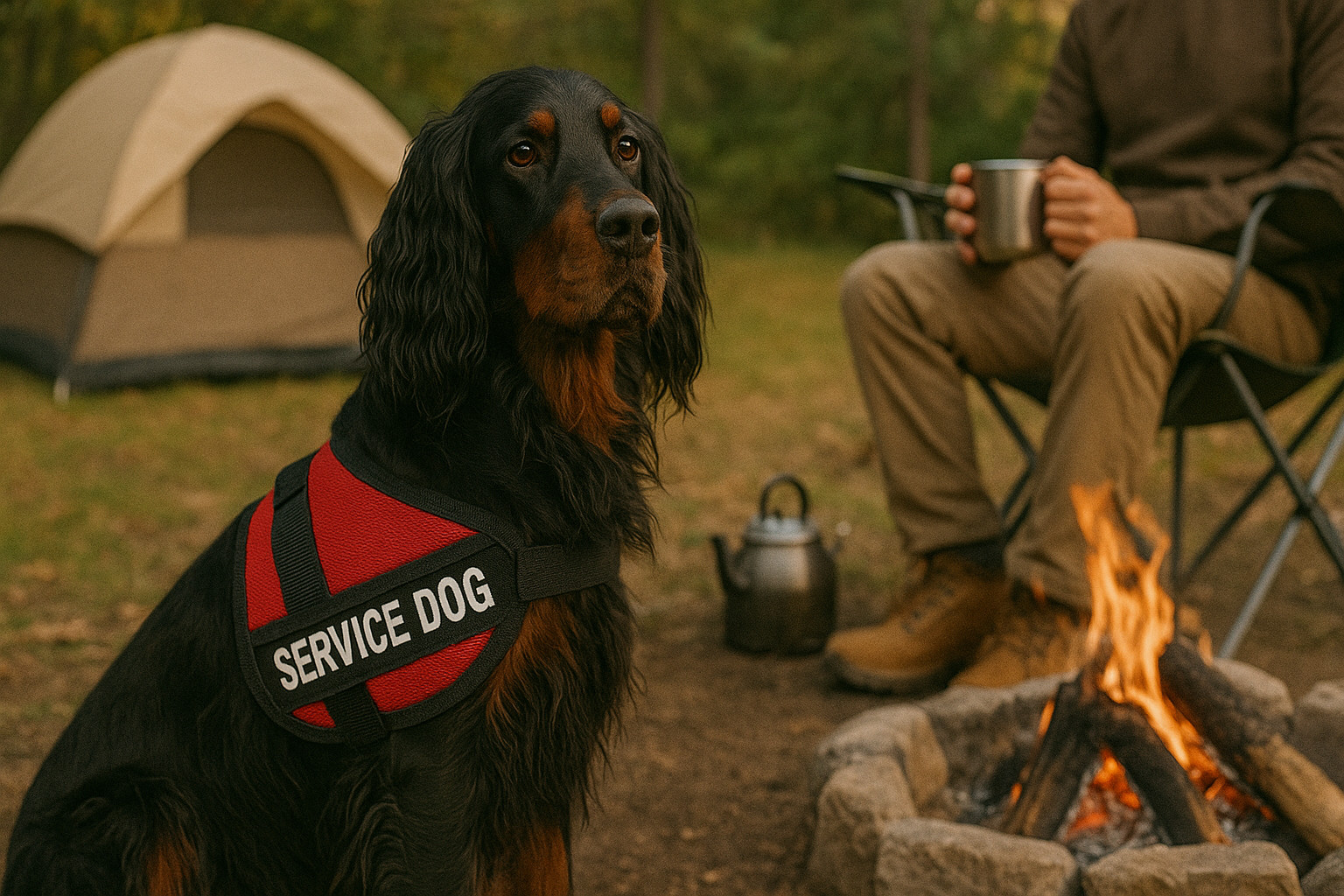Gordon Setter as a Service Dog

Gordon Setter Overview
The Gordon Setter is a relatively lesser-known breed in the world of service dogs. Originating from Scotland, this breed is part of the setter group, known for their hunting capabilities, intelligence, and striking appearance. While not as commonly used as Labradors or German Shepherds, the Gordon Setter has potential qualities that could be beneficial in specific service dog roles. This article will explore the breed’s physical attributes, temperament, types of service work they may be suited for, health considerations, and training suitability.
Physical Characteristics
Gordon Setters are a striking breed with a distinctive black and tan coat. They are medium to large-sized dogs, typically weighing between 45 to 80 pounds and standing 23 to 27 inches at the shoulder. This robust build provides the strength and size necessary for various service tasks, such as mobility assistance. The breed’s long, feathered ears and glossy coat give them a regal appearance, but these features also require frequent grooming to maintain optimal health and appearance.
Their physical strength and endurance are attributes that suggest they might excel in roles that require stamina and agility. Gordon Setters were historically bred for hunting, which means they possess impressive speed and pointing abilities. These characteristics could be leveraged for tasks that involve fetching or alerting to changes in environment or behavior. However, their energetic nature necessitates regular exercise, which may not suit all service dog handlers, particularly those unable to provide daily activity.
Temperament and Attitude
Gordon Setters are known for their intelligence, confidence, and loyalty, traits that can be highly advantageous in the context of service work. They are generally good-natured and develop strong bonds with their human companions. However, this loyalty can sometimes translate to aloofness with strangers, which may not be ideal in all service dog scenarios, particularly those that require regular interaction with the public.
The breed’s high intelligence makes them quick learners, but it also means they can become bored if not adequately challenged or engaged. This trait necessitates consistent training efforts and mental stimulation. Additionally, Gordon Setters have a strong prey drive inherent to their hunting lineage, which requires careful management in environments where focus and composure are paramount.
Types of Service Work
Gordon Setters may excel in certain niche service dog roles, particularly those that complement their natural abilities and temperament. Potential service roles for this breed might include:
- Mobility Assistance: Due to their size and strength, Gordon Setters could aid in tasks oriented toward physical support, such as pulling wheelchairs or providing balance assistance.
- Medical Alert: Their keen senses could be honed to perform medical alert tasks, such as detecting changes in scent that signify seizures or fluctuations in blood sugar levels.
- Search and Rescue: Leveraging their hunting history and stamina, Gordon Setters could participate in search and rescue operations, although this is more a working role outside traditional service dog guidelines.
While they have potential for these roles, not every Gordon Setter will match the demands of service work, and individual temperament plays a huge role in determining suitability.
Health Considerations
Gordon Setters are generally healthy dogs, but like any breed, they are prone to certain health conditions that should be considered when selecting a service dog. Common health problems within the breed include:
- Hip Dysplasia: A condition that can affect mobility and physical comfort, hip dysplasia can be a serious concern for dogs intended for mobility assistance roles.
- Progressive Retinal Atrophy (PRA): This condition can lead to blindness and may impact their ability to perform in roles requiring acute vision over time.
- Hypothyroidism: This can influence energy levels and overall health, potentially impacting a service dog’s endurance and recovery time.
Regular veterinary check-ups and a good breeding program focusing on health screening are imperative to ensure the best candidates for service work.
Training and Suitability
Gordon Setters are intelligent and trainable, but they also possess a certain independence that can make training a challenge for inexperienced handlers. A firm yet gentle training approach works best with this breed. Early socialization and consistent training from puppyhood are crucial in mitigating potential behavioral issues such as aloofness or high prey drive.
Despite their trainability, Gordon Setters require a handler willing to engage in ongoing training and mental stimulation. They are not suitable for handlers who cannot commit to providing daily physical exercise and cognitive challenges. Their trainability makes them potential candidates for specialized tasks, but they are generally better suited for experienced dog owners or trainers familiar with the breed’s unique needs.
Summary of Gordon Setter
In summary, the Gordon Setter possesses several strengths that can be advantageous in particular service dog roles, though there are considerations to keep in mind:
- Strengths:
- Strong and robust for physical support tasks.
- Intelligent and trainable, with the ability to learn complex tasks.
- Loyal and devoted, forming strong bonds with handlers.
- Weaknesses:
- Energetic and independent, which can require a high commitment to training and exercise.
- Health susceptibilities like hip dysplasia and eye disorders.
- Social aloofness, not always ideal for highly public service roles.
- Ideal Roles:
- Mobility assistance: leveraging their strength.
- Medical alert: utilizing their keen senses to detect changes in health conditions.
- Environments where independence and high energy are an asset rather than a limitation.
In conclusion, while the Gordon Setter may not be the most conventional choice for service work, with the right training and handler, they can bring unparalleled dedication and capability to specific tasks and responsibilities. Careful consideration of individual temperament and health is crucial in determining their suitability as service dogs.











